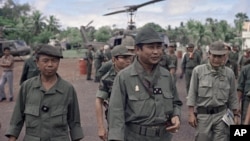As Cambodia marks the 24th anniversary of the Paris Peace Accords, Prime Minister Hun Sen says much of the country’s woes could be blamed on a US-backed regime from the 1970s.
That government, led by Marshall Lon Nol, ousted late King Norodom Sihanouk in a bloodless coup in March 1970, only to fall to the Khmer Rouge five years later.
Speaking at a bridge inauguration Thursday, ahead of the Oct. 23 anniversary and in front of the Chinese ambassador to Cambodia, Hun Sen said the Lon Nol regime should be held responsible for the wars that followed its collapse. He praised China for its support of Cambodia today, though he did not mention China’s roll in supporting the Khmer Rouge.
Had it not been for the Lon Nol regime and its ushering in of the Khmer Rouge, the Paris Peace Accords would not have been necessary, Hun Sen said.
“If we had not had war in the 1970s, Cambodia would have developed further, but how do the creators of the war take responsibility?” he said. “They have to at least be responsible over morality if they don’t take responsibility for the damages and the deaths of millions of Cambodian people in the war and in the period of genocidal regime of Pol Pot.”
His remarks, at the inauguration of a second bridge in the Chroy Changvar section of the city, allude to the US role in the toppling of the former monarch, and the bombing campaign that followed. (In the ensuing war with the Khmer Rouge, such bridges were destroyed.)
Ou Virak, head of the think tank Future Forum, said Hun Sen was referring to the US and the “tons of bombs” it dropped on Cambodia, a portion of history that should be examined.
“If we want to step up to debate Cambodia from every angle and learn lessons, I welcome that, and I think it’s a good thing,” he said. But that means one should also discuss the roles of China and Vietnam in the war years, including their support for the Khmer Rouge, he said. Other discussions could include the debt incurred by Cambodia during its war years—and its forgiveness, he said.
Son Soubert, former leader of the Constitutional Council, said Cambodia was in the past a “battleground” for superpowers. The Paris Peace Accords put an end to that, he said, but they have not been fully implemented.
The 18 signatory countries to the accords should now review their implementation, he said, “and ask Cambodia to reform the unfulfilled points, especially the issue of freedom of expression for the people.”







